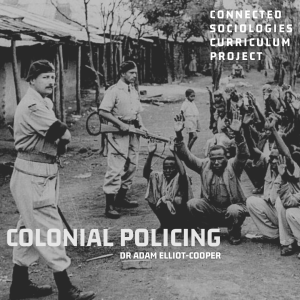
7.4K
Downloads
32
Episodes
Sociology is based on a conventional view of the emergence of modernity and the ‘rise of the West’. This privileges mainstream Euro-centred histories. Most sociological accounts of modernity, for example, neglect broader issues of colonialism and empire. They also fail to address the role of forced labour alongside free labour, issues of dispossession and settlement, and the classification of societies and peoples by their ‘stages of development’. The Connected Sociologies Curriculum Project responds to these challenges by providing resources for the reconstruction of the curriculum in the light of new connected histories and their associated connected sociologies. The project is designed to support the transformation of school, college, and university curricula through a critical engagement with the broader histories that have shaped modern societies.
Episodes

Monday Feb 15, 2021
Colonial Policing - Dr Adam Elliot-Cooper
Monday Feb 15, 2021
Monday Feb 15, 2021
Standard discussions of police racism in Britain, present it as being a consequence of Britain becoming multicultural, as African, Caribbean and Asian people migrated to Britain in significant numbers after World War 2. These migrants are seen as disrupting a peaceful, united monocultural Britain. But historically, most of Britain’s policing hasn’t taken place on British soil – it has been deployed in its colonies. Millions of colonial subjects, exploited and controlled for the enrichment of Britain for centuries, required policing. British colonial policing was far more militarised and violent than policing on the British mainland. The racial hierarchy of the British Empire – the racism of colonialism – is what justified the violence and exploitation Britain imposed on the Africans, Asians and Caribbean people it colonised.
Readings
- Nijjar, J (2018) Echoes of Empire: Excavating the Colonial Roots of Britain's "War on Gangs", Social justice 45(2/3):147-161.
- Moore, J.M. (2016) Built for inequality in a diverse world: The historic origins of criminal justice, Papers from the British Criminology Conference.
- French, D (2012) Nasty not nice: British counterinsurgency doctrine and practice, 1945–1967, Small Wars & Insurgencies, 23:4-5, pp . 744-761.
Resources
- BBC Documentary - Kenya: White Terror
- BBC Four - Racism: A History
Questions for Discussion
Below are two short film clips and questions for discussion:
- Pathe British Colonial Films - Mau Mau Disorders In Kenya (1952)
- Pathe British Colonial Films - The Mark Of The Mau Mau - Exclusive (1953)
- What is the relationship between the police and military during the ‘Kenya Emergency’?
- Which tactics appear to be familiar with policing today?
- What role does the court system play in how the Emergency is portrayed to both Kenyans, the British and the wider world?
- Which tactics appear to be more commonly associated with military operations?
General Discussion Questions:
- Why was violence and control such an important part of colonial rule?
- Is the violence and control of colonialism something which is well-remembered in Britain? If not, why not?
- How has colonialism’s legacies shaped racism today?

No comments yet. Be the first to say something!